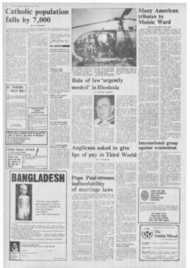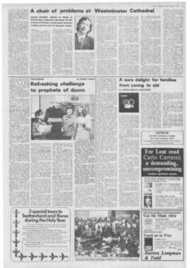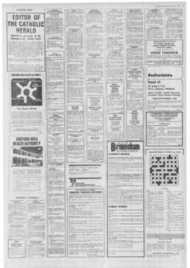Page 10, 7th February 1975
Page 10

Report an error
Noticed an error on this page?If you've noticed an error in this article please click here to report it.
Tags
Share
Related articles
Why Dr Fitzgerald Wants Britain To Stay In Eec
Faith Moving The Butter Mountain
Ireland's Three Dimensions
"st. Patrick's Holy Places Cut Off From Ireland"
Dublin Diary
DUBLIN DIARY by OONACH "MASON
First big test of Ireland's EEC Presidency
We are now into the second month of' Ireland's Presidency of the European Community, and the first major meeting Eliot of the Communities' nine Foreign Ministers takes place next Thursday and Friday. The Heads of Government meet on March 10 and 11, followed, closely by the arrival of Mr Pierre Trudeau, the Canadian Prime Minister on March 14 and 15.
What does the Presidency of the European Community mean to Ireland? How difficult is it For a nation of just over three million people to provide the same, or similar, facilities as nations of 53 million people such as France? Will Irish internal politics and decisionmaking suffer as more TDs (MPs) are needed for the European front?
Just posing these questions shows that the very least that the Presidency means to the Irish people is that it has made them increasingly aware that there is more to being a member of the European Economic Community than just the question of how much the country will receive from the Regional Fund.
There are, or will be, economic benefits, but there are also responsibilities, and a share in decision-making. Ireland is an equal me mbei with the other eight countries and must take her turn with the duties accompanying equal membership.
The burden of responsibility, when Ireland took over the Presidency from France in January this year. fell on the shoulders of Dr Garret FitzGerald, the Minister for External Affairs. He became the President of the Council of Ministers, drawing up the Council's agenda, conducting its meetings and acting as its official spokesman, particularly in the European Parliament.
Under the provisions or the Second Report on Political Cooperation (Copenhagen, July, 1973) a minimum two meetings of' the nine Foreign Ministers must take place during each 'Presidency: these will take place in the host capital. The groundwork for the meetings is prepared in Dublin by senior Civil Service officials front each country.
These are further serviced by other committees and other groups, some specialising in certain areas of interest such as the Middle East or the United Nations, All or these committees must be chaired by Ireland.
In the economic area, about 190 committees of specialists are meeting in Brussels. These must also be chaired by Ireland. Most of these chairmen will be drawn from the Civil Service, but the total strength of the Department of Foreign Service is only 670 people, and of that figure half are servicing missions abroad, and only 190 are in fact diplomatic staff. One can understand that there are ciroblems.
Denmark, the only country roughly equivalent to Ireland's size within the EEC. overcame similar difficulties during its Presidency in 1973, The Secretary of the Irish Department of Foreign Affairs visited Denmark in November, 1973, to see at first hand the problems that were likely to arise.
Most of these have been ironed out by forward planning and preparation. So far everything has beeh working very smoothly indeed. but the first big test will be the Foreign Ministers' meetings. These will be held in Si Patrick's Hall ' in Dublin Castle.
Dublin Castle was built in the early 13th century. and was the seat or Government and Courts oi' Law, but is was in the 18th century that most of the present-day buildings were erected. The State Apartments were also reconstructed at that time, and by 1779 it was said: "This Castle is far superior to the Palace of St James as well in the exterior as the site and the eleagrie of the apartments The Castle was handed over to the Irish nation in 1922 by Lord Fitzalan, the Lord Lieutenant. It is no longer the centre of power in the country. but is used for important formal occasions, such as the inauguration of the President.
St Patrick's Hall was used originally as a ballroom, and has at each end of the hall a gallery, one for spectators and one for
inultsicdiaernisv'es its name from its association with the "Most Illustrious Order of St Patrick," instituted in 1783 by King George III, This order was the then Irish equivalent of the Order of the Garter in England and of the Thistle in Scotland. Over the galleries is the star of St Patrick, the emblem of the Order.
• Front 1783 the ceremonial meeting of the Order of the Knights of St Patrick took place in the hall, and after the disestablishment of the Church of Ireland in 1869, the investitures of the Knights (which had previously been carried out in St Patrick's Cathedral where some of the banners still hang) were made in the hall. The crest, helmets and banners (proudly hanging) of some of Knights are kept in good repair. It is a part of Ireland's tradition.
The new press centre in the Castle was previously old office accommodation. This, it is hoped will be kept as a press centre when Ireland hands over the Presidency to Italy (the United Kingdom's turn comes in 1977) next June. The renovations, refurbishing and the provision of up-to-date equipment, which had been put off over the years, had to be finished and ready for January of this year. The availability of interpreters was not a problem. For the Heads of State meeting, instantaneous translators will be brought from Brussels where there is a team of people trained in the ways of Civil Service a team which is ready for occasions such as this.
For the political committees the official language used is
French. The Irish Civil Service, when Ireland startgd looking towards Europe in the early six• ties, set up its own training centre for French, so that now its own members who need the official language for their work arc fluent speakers.
Accommodation raises no particular problems, as the Ministers will stay in their own Embassies. This is normal practice otherwise sccurity would
be very difficult. The Ministers' staff will stay in hotels.
The 1,000 extra people, mainly journalists. expected during the European Council of Heads of Government in March, one is assured, will not create any problems. Mind you, it will be a bit of a squeeze if they all decide to stay over for St Patrick's Day. when the first contingent of American visitors (dressed mostly in green and accompanied by high-stepping, high school student bands) arrives to take part in the parade down O'Connell Street.
Dr Garret FitzGeraid feeis that each country should bring to its period of office a clear idea of what results it would like to achieve, and that it should make the preparation necessary to pave the way for achieving them. lie further feels that one of Ireland's most important tasks. will be to take the necessary initiatives to ensure that the economic recovery now being planned is carried through successfully.
This would require careful monitoring of economic developments in the immediate future. and close co-operation with the United States, to ensure a co-ordinated policy on both sides of the Atlantic.
The decision to establish a Regional Fund means that it is the responsibility of the Irish
Presidency immediately to implement this decision. The
necessary Community legislation must be prepared and put into effect. A balanced solution must also be found for Britain's renegotiation.
Dr Garret FitzGerald would like very much to move forward as rapidly as possible towards
direct elections for the European Parliament. A committed
European, he would hope during his term of office to advance perceptibly the European cause during this first half of 1975.
blog comments powered by Disqus











